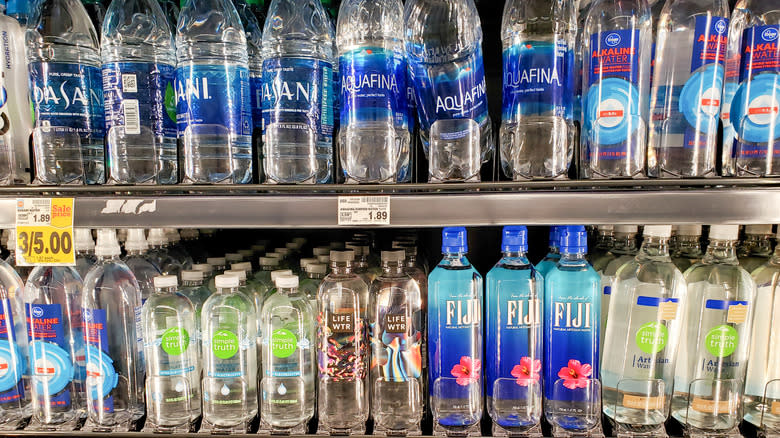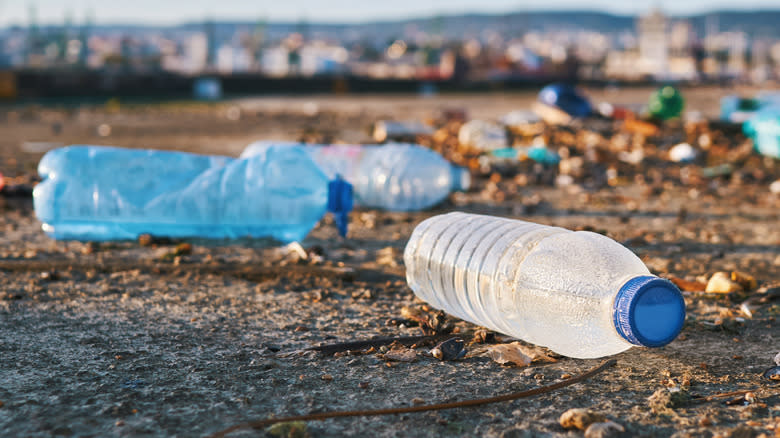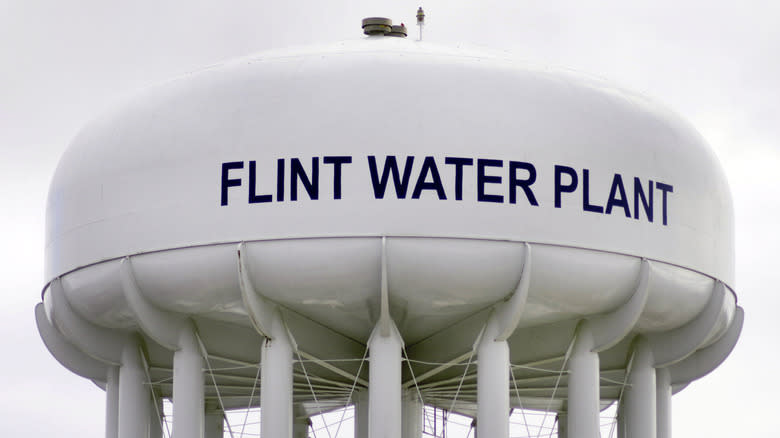Why The US Loves Buying So Many Plastic Water Bottles

It's general knowledge that the human body is made of approximately 60% plastic. Did we say plastic? We meant water. Our mistake ... or was it? After all, the realities of 21st-century life mean a smidgeon of plastic can be found virtually everywhere, including in fast food and inside our bodies. Not that the potential presence of microscopic pieces of plastic (aka microplastics) floating around our bloodstreams has curbed our societal dependence on plastic materials -- as the many purveyors of plastic bottled water brands in the U.S. can attest.
Now, the massive, wide-scale consumption of water sold in plastic bottles (as in single-use, not reusable water bottles) isn't relegated solely to U.S. consumers, of course. But the undeniable popularity of plastic water bottles -- a commodity that's simultaneously wasteful and environmentally destructive -- is so typically American that it borders on parody.
Interestingly enough, the rationale behind our national obsession with plastic water bottles isn't nearly as simple as you might imagine. In fact, after conducting a deep dive into the possible reasons for its strong sales presence, we found a surprisingly multifaceted explanation. To discover the answers to this patriotic preference, keep reading as we break down why the U.S. loves buying so many plastic water bottles.
Read more: Things You Should Never Put Down Your Drain
Aggressive Marketing Campaigns By Beverage Companies Created A Loyal Customer Base

Human beings are incredibly susceptible to persuasion ... permitted there's at least a kernel of credibility in what's being sold. For proof, look no further than the endless selection of inane and essentially useless kitchen appliances in existence. Along those lines, since 92% of U.S. residents have access to safe and reliable tap water (per United States Environmental Protection Agency), companies have had to convince us that plastic water bottles are worth purchasing -- a task that's been accomplished, in part, through a number of aggressive marketing campaigns.
Given so much of the country has no real need to purchase plastic water bottles, companies behind brands like Dasani have relied heavily on advertisements to change the innate perception of plastic water bottles as being unnecessary. And thanks to the magic of clever marketing strategies and relentless advertising, that message has made it through the noise.
Of course, the additional fact that no brands of tap water exist has tremendously helped the rise to prominence of plastic water bottles. "Utilities don't have marketing budgets," after all, as the author of "Bottlemania" Elizabeth Royte pointed out to NPR in 2008. With no retort from its supposed tap water rival, the commercial promotion of plastic water bottles has gone largely unimpeded -- leading to a loyal customer base in the U.S.
Bottled Water May Provide Essential Minerals Not Found In Tap Water

The jurisdictional addition of fluoride into public water systems throughout the U.S. (a controversial practice we'll address momentarily) indicates tap water isn't wholly devoid of beneficial ingredients beyond its basic elements. But compared to the number of essential minerals found in, ahem, mineral water, tap water is often lacking. For that very reason, a number of individuals in the U.S. prefer the nutritional boost provided by mineral water and consequently, choose to drink it from plastic bottles over tap.
Now, unlike some other explanations for plastic water bottles' widespread popularity, we can respect those who choose to buy and drink mineral water in lieu of utilizing the sink. After all, mineral water sold in plastic bottles generally contains a higher level of detectable, health-sustaining minerals (including magnesium and calcium) than what you'd typically find from a faucet-poured alternative, based on a 2001 study published in the Journal of General Internal Medicine.
In other words, since many of the nutrients found in mineral water are essential to the human body, it's understandable why a substantial portion of American hydration seekers prefer buying these types of plastic water bottles.
A Number Of Americans Are Unfazed By The Environmental Damage Of Plastic Water Bottles

We'd guess the majority of U.S. water drinkers aren't entirely sure where the titular liquid inside their plastic water bottles originates. Similarly, we expect that most people have little to no idea where their plastic water bottle ends up after they've finished drinking it. Unfortunately, a number of Americans don't care about a plastic water bottle's journey after it's discarded; and that lack of environmental concern helps paint the picture explaining our nation's love of plastic water bottles.
Now, this plastic vessel isn't the only culprit of the catastrophic environmental damage caused by man-made, mass-produced plastic products, of course. Yet even if it was, it's hard to envision many Americans would suddenly decide to curb their personal preference just to help the planet. Until all Americans are willing to pay a bit more out of pocket (across the board) for everyday items to cut down on plastic usage, the popularity of plastic water bottles isn't apt to decrease.
Some Consumers May Find Bottled Water Tastes Better Than Tap

Water is water, right? Of course it is. In fact, unless we're talking about flavored water, the bottom line is water tastes like water tastes like water. Yet somehow, a handful of individuals disagree with that fairly straightforward assessment of water's flavor profile. In fact, while we're quick to declare the difference between tap water and bottled water is essentially negligible, others seem to believe plastic water bottles offer a superior beverage than what comes from their kitchen faucet.
Is there any real logic to explain why 43% of respondents declared bottled water tastes better than tap in a 2021 survey? Not that we're aware of. Of course, we're not suggesting those individuals aren't entitled to their opinion. But with no underlying basis we can comprehend that would elevate one type of plain water over another, it still seems like the sort of stance meant to convey a sophisticated palate rather than an accurate reflection of one's belief. Despite our inability to grasp the rationale for this plastic water bottle preference, there's no denying it offers one of several explanations for why the U.S. loves buying the product.
Many US Residents In Rural Areas Don't Have Consistent Access To Safe Tap Water

For a number of U.S. residents, the concept of having access to safe drinking water is just a basic fact of life. But the reality in such a large and diverse nation means there are no universal truths or experiences. With that in mind, folks who've lived a life free from unsafe or dangerous tap water may not realize some Americans in rural areas occasionally endure those very problems -- or that a genuine lack of safe-to-drink tap water is the reason why certain plastic water bottle consumers choose it.
To be clear, it's utterly unconscionable to think a nation as wealthy and capable as ours could allow any citizen (or non-citizen) to live their life sans contaminate-free running water. Unfortunately, the neglect of water infrastructure in areas throughout the country has left certain individuals living in towns and cities with no other option beyond plastic water bottles.
It's not hard to think if we simply prioritized investing money to improve and maintain public water systems in every corner of the U.S., a decent number of people would stop buying plastic water bottles. As it stands, the lack of proper water infrastructure maintenance in some rural pockets compels those unlucky enough to live there to buy plastic water bottles.
A Debate Over The Safety Of Added Fluoride In Tap Water Has Existed For Decades

The prominence of conspiracies in the modern world might seem like an unfortunate byproduct of the internet and social media. However, culturally pervasive conspiracy theories have always been woven into the fabric of human existence -- like the notion that then-Communist Russia was tainting the "precious bodily fluids" of U.S. denizens by adding fluoride to tap water. In fact, long-running (though generally unfounded) suspicions surrounding the safety of fluoride have caused some people in the U.S. to bypass that option altogether by buying plastic water bottles.
Quite frankly, we didn't realize a backlash against added fluoride in tap water -- somewhat akin to the stance taken by the deranged General Jack D. Ripper (Sterling Hayden) in "Dr. Strangelove: Or How I Learned to Stop Worrying and Love the Bomb" -- was an actual occurrence among the population. But the debate regarding fluoride's efficacy as a public drinking water additive stretches back further than the release of Stanley Kubrick's seminal satire.
Since some consumers remain staunchly convinced fluoride is more harmful than helpful -- even in the 21st century -- it's more likely than not that segment of the U.S. population will continue buying plastic water bottles with impunity.
Some May Falsely Believe The Cost Of Running Water Is Pricier Than Bottled Alternatives

The human race is inherently gullible, which leads us to one possible (if implausible) reason why the U.S. loves buying so many plastic water bottles: Some people may believe paying for running water is more expensive than purchasing plastic water bottles.
It's sort of unfathomable to think any reasonable person could genuinely believe it's financially prudent to pay for plastic water bottles ad nauseam rather than simply pay a utility bill (even if they're struggling to afford their water bill). Yet we've also spent a lifetime observing folks caught hook, line, and sinker -- or willing to trust in something when all available evidence suggests they shouldn't.
It simply wouldn't be shocking, then, to learn some people choose plastic water bottles because they think they're besting the Water Works by doing so. We just can't elaborate on what could possibly trigger such a train of thought in the first place.
Consumers May Think Bottled Water Is Safer For Individuals With Weakened Immune Systems

With so many individuals wary about potentially toxic components being found in their tap water, the impulse to consider the presumably safer alternative of filtered water purchased in plastic bottles is understandable. Of course, while the supposedly inherent risks of parasitic organisms in tap water are undeniably overblown, for folks living with a compromised or weakened immune system, the choice to buy plastic water bottles may be driven by a search for perfectly safe (and 100% untainted) drinking water.
Of course, federal and state laws regulating (and ensuring) the safety of tap water exist, but that doesn't mean individuals living with medical conditions can afford to throw caution to the wind with any drink or food they ingest. With that in mind, the FDA-mandated standards for plastic water bottle production may offer at-risk folks a sense of ease they don't get with tap water -- leading to one explanation (among many, of course) for the country's obsession with buying plastic water bottles.
Certain Bottled Water Brands Are Seen As A Status Symbol Of Sorts To Consumers

Perception is all that matters in the modern world -- at least that's what we want you to think we believe (see what we did there?). Now, the mere act of publicly purchasing plastic water bottles instead of ingesting tap water isn't necessarily hoity-toity on its own. Then again, some U.S. residents may only be willing to pony up a pretty penny for a plastic water bottle if it's from a certain brand (like Fiji). In other words, some people love buying plastic water bottles because they project a certain (and preferred) image.
Why someone would choose to flaunt their personal success by spending an exorbitant amount of money on a so-called luxury bottled water brand is beyond us. We realize status symbols exist in every aspect of life. But we're still talking about water here, folks. It's literally a flavorless, bland key-to-life beverage -- so perhaps it makes perfect sense that a significant portion of the U.S. is willing to pay a premium for a purportedly top-shelf plastic water bottle.
Maybe status-defining plastic water bottle brands are simply a natural product of capitalism in the U.S., which drives people to make as much money as possible and then show off their earnings. If that's the case, it would make sense for countless Americans to purchase plastic water bottles (provided they're from the right brand).
The Mid-2010s Water Crisis In Flint, Michigan, Likely Stoked Further Distrust Of Tap Water

The notion of tap water being anything but safe to consume is the stuff of nightmares for most Americans. However, the prospect of dealing with genuinely unsafe local drinking water was a waking reality for residents of Flint, Michigan, starting in 2014. Unsurprisingly, the terrifying and maddening years-long water crisis forced many Flint residents into drinking water from plastic bottles -- but only because they had no other choice.
The inability of federal, state, and local authorities to actually fix the issue at hand in a timely manner -- and provide the basic necessity of safe drinking water to the people of Flint before 2019 -- undoubtedly forced the city's population to embrace plastic water bottles. Yet we can't help but conclude some people elsewhere saw the mess in Michigan and decided they too would avoid tap water from that point forward.
Even if we don't have any specific evidence to verify our hunch regarding a possible uptick of plastic water bottle purchases outside Flint, we're confident in our inference. And with no evidence to the contrary either, we feel it's fair to include this as a key reason why the U.S. loves buying plastic water bottles.
Lingering Worries Over Forever Chemicals In Tap Water Continues To Drive Bottled Water Sales

We noted that the staggering prevalence of plastic in modern commercial products means there's plastic floating inside our bodies at any given time. Additionally, the lingering danger of chemicals casually used (and discarded) throughout the world is hardly unknown to many U.S. residents. As such, the widely reported presence of so-called forever chemicals in tap water may explain why some people in the U.S. are so fond of plastic water bottles.
A 2023 U.S. Geological Survey study revealed forever chemicals, known as polyfluorinated alkyl substances (or PFAS), were detected in an eyebrow-raising 45% of the nation's tap water. This disconcerting statistic makes it clear that certain individuals hesitant to drink running water aren't acting out of illogical impulses (at least not always).
With so much uncertainty regarding the potential negative impact of PFAS on the human body, we can't entirely blame anyone resistant to tap water consumption. We just wish a less detrimental overall option was available in the U.S. beyond buying plastic water bottles.
Read the original article on Mashed.

